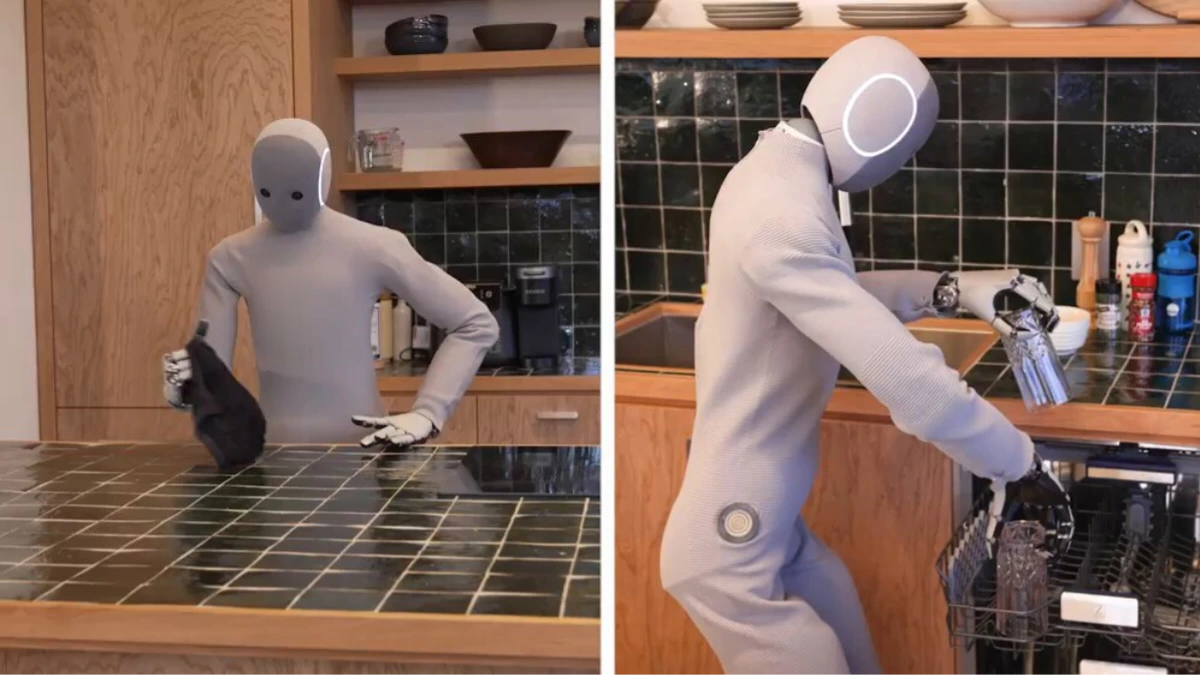The line between science fiction and daily life just blurred. Robotics company 1X has opened preorders for the 1X NEO humanoid robot, a consumer ready domestic assistant designed to handle everyday chores and adapt over time.
From folding laundry to organizing shelves, NEO aims to transform how households approach repetitive tasks. The company described it as “the safest, most capable, and most affordable humanoid ever built,” bringing a once-futuristic vision of home robotics into the present.
The launch of the 1X NEO humanoid robot signals a turning point in the robotics industry. For decades, humanoid robots such as Honda’s ASIMO and Boston Dynamics’ Atlas showcased potential but never reached consumers.
High costs, safety concerns, and limited functionality kept them confined to research labs. 1X, founded by Norwegian entrepreneur Bernt Børnich, hopes to change that.
“Humanoids were a thing of research, but with NEO, they become a product,” Børnich said in a statement. “It’s something you can reach out and touch.”
Weighing about 66 pounds, NEO can lift more than twice its own weight and operates quietly at just 22 decibels. The robot is equipped with WiFi, Bluetooth, and 5G connectivity, allowing it to interact seamlessly with modern smart homes.
Its most distinctive feature is its intelligence: NEO runs on a proprietary AI model that integrates voice understanding, vision recognition, and adaptive learning. It doesn’t rely on screens; instead, users can speak naturally to assign tasks or ask questions.
Experts say the debut of the 1X NEO humanoid robot marks a critical step in the evolution of home automation, but they also note that its success will depend on accessibility, safety, and trust.
“NEO could represent the next major shift in domestic technology if it delivers on performance and affordability,” said Dr. Amara Lewis, a robotics professor at Stanford University.
“For years, we’ve had robotic vacuums and voice assistants. What NEO offers is full bodied interaction a robot that can think, move, and respond.”
Lewis added that by combining large language models with physical dexterity, NEO bridges a long standing technological gap. “The integration of natural movement with contextual understanding is what makes this moment historic,” she said.
Still, some analysts remain cautious. “The public is ready for smarter robots, but they’re also skeptical,” said Jonathan Kim, a senior technology analyst at Global AI Watch. “Data privacy, malfunction risks, and unrealistic expectations are still major concerns in this market.”
The 1X NEO humanoid robot enters a market poised for growth. According to Statista, the global home robotics market valued at $12.4 billion in 2024 is expected to surpass $25 billion by 2030.
Most of that growth has been in cleaning robots and smart devices, leaving humanoids as an untapped frontier. Unlike earlier prototypes, NEO is designed for real world homes.
It can fold clothes, open doors, recognize objects, and remember user preferences. Its patented “Tendon Drive” system, built on high torque motors, allows NEO to move with humanlike precision while maintaining safety around people.
“From a mechanical engineering standpoint, 1X is breaking ground by pairing lightweight design with power and control,” said Dr. Ryo Tanaka, a robotics engineer at the University of Tokyo.
The hardware now matches the sophistication of its AI something we haven’t seen before. Interest in the 1X NEO humanoid robot has grown quickly since preorders opened. Early adopters say they see potential beyond convenience.
“As a working parent, I’m constantly juggling chores,” said Rachel Adams, a marketing executive in New York. “If NEO can handle even basic cleaning and organization, it’s not just a gadget it’s relief.”
Others are intrigued but cautious. “It’s amazing technology, but I’d need to know it’s secure,” said Fahad Malik, an IT specialist in Dubai. “A robot that listens and learns must also protect personal data. That’s the real test.”
1X said NEO’s “Audio Intelligence” only activates when directly addressed, and all data is stored locally unless users opt into cloud synchronization. The company added that users can review or delete stored memory at any time.
Industry experts expect humanoid robots like NEO to first appeal to tech enthusiasts, elderly care facilities, and high income households before becoming mainstream. With regular software updates, NEO is expected to learn new tasks over time, such as meal preparation and item retrieval.
Today it folds clothes; tomorrow it could assist the elderly or provide companionship, Lewis said. “This is the foundation for long term human robot collaboration.”
Governments and labor organizations are also monitoring the trend closely. Automation advocates highlight its potential to offset labor shortages, particularly in care sectors, while critics warn of economic displacement.
“The societal implications are enormous,” Kim said. “Humanoid robots could redefine domestic work, but policymakers must address questions of regulation, safety, and accountability.”
The arrival of the 1X NEO humanoid robot represents more than a technological milestone it marks the beginning of a new domestic era where artificial intelligence and robotics merge in everyday life.
As 1X prepares to ship its first consumer units, NEO stands as both a promise and a test whether humans are ready to welcome a machine that doesn’t just assist with life’s chores, but learns and lives alongside them.
